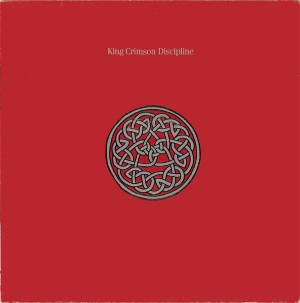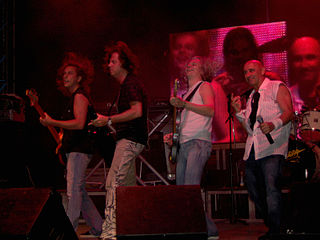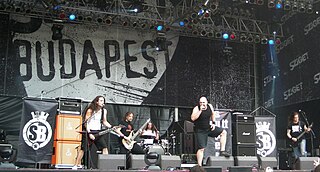Panta Rhei | |
|---|---|
| Also known as | P.R. Computer |
| Origin | Debrecen, Hungary |
| Genres | Symphonic rock, progressive rock, jazz rock, electronic |
| Years active | 1974–1982, 2017– |
| Members | Enikő Ács András Kálmán Mátyás Milkovics András Szalay Dániel Szalay Alex (Sándor) Szalay |
| Past members | József Nagy Kálmán Matolcsy Alex (Sándor) Szalay András Szalay Csaba Béke Gyula Moldován Miklós Kiss Enikő Ács András Laár András Schmitt |
Panta Rhei were a Hungarian rock band, known for their progressive rock recordings and adaptations of classical music, for which they created synthesizers, such as the Muzix81 system. The band name refers to the philosophy of Heraclitus.
Panta Rhei formed in Hungary in 1974, consisting of Kálmán Matolcsy who played keyboards and synthesizers, Alex Szalay on guitar, András Szalay on bass and Csaba Béke on drums. They designed and built their own kinds of synthesizers.
Between 1974 and 1982 they played various styles of music ranging from jazz to progressive rock. In 1976 Miklós Kiss briefly joined the group, and contributed to a track for the Bartók album. Also in 1976 Enikő Ács joined the band as a vocalist and Csaba Béke returned on drums, contributing to the other tracks of the Bartók album recorded between 1975–1977. However, this album with adaptations of Béla Bartók's works was never released due to objections by the Bartók family. The recordings were supposed to be released again on the Epilogus 2 CD version twenty years later, but the Bartók family objected again, so the CD was reduced to a single, and the unpublished material is only available on the web .
By 1980 Panta Rhei released their first album titled Panta Rhei, having a sound different from the jazz rock and classical adaptations of the rock days of the band, with a more progressive rock / pop rock crossover sound. By then, Enikő Ács and Csaba Béke had left and were replaced by András Laár on guitar and vocals and András Schmitt on drums. Both Schmitt and Laár remained in Panta Rhei until 1981, assuming drummer Béke would return. In 1982 the band performed their last concert and the band also broke up in 1982, returning to their familiar Symphonic Prog Rock sound.
In 1981 singer and guitarist András Laár would go on to form the Hungarian new wave and pop rock band KFT.
After Panta Rhei ended in 1982, in 1983 they continued recording under the banner of "P.R. Computer" and released an album of the same name which sold over 80,000 copies and established their noticeable work. The album was recorded with entirely electronic music, using the latest custom built synthesizers and computers, hence the new name "P.R. Computer". P.R. can be read as progressive rock or Panta Rhei, P.R. Computer was active up until 1989.
In 2017 Panta Rhei returned to the stage and tours again.
Panta Rhei sold records in Eastern Europe and the Soviet Union and were known for their classical adaptations of Béla Bartók's and Edvard Grieg's works.
Panta Rhei were influenced by progressive rock bands Emerson, Lake & Palmer, The Nice, King Crimson, and others. ELP influences are blatantly heard in their early works, especially on the unreleased Bartók album recorded in 1977, as the music is driven by Hammond organ, drums and bass in the same way ELP presented their music; also synths were a main part of Panta Rhei's music.
During their recording career Panta Rhei issued 2 LPs, 6 singles and recordings for film and ballet. Their albums sold over 100,000 copies in Hungary and Eastern Europe, whilst the band was mainly amateur they managed to record and release a few material in their entire lifespan.
A compilation CD called Epilógus (English: "Epilogue") of previously unpublished material was released in 1998, featuring three fusion pieces from 1977 and a 22-minute prog rock epic, Peer Gynt Suite recorded in 1976 and, ennobled to a must-hear for progressive rock fans, Epilógus features electronic music from 1983 until the latter 80s under the "P.R. Computer" banner. 2002 saw a release of a book about the band that included a CD with a collection of songs recorded 1975–79.
| Panta Rhei - line up changes 1974–1982 |
|---|
| Kálmán Matolcsy / keyboards (1974–1982) Sándor (Alex) Szalay / guitar (1974–1982) |
| Panta Rhei - reunion |
|---|
| Sándor (Alex) Szalay / guitar András Szalay / vocals and bass |
Alex Szalay is now working as a Bloomberg Distinguished Professor of Physics & Astronomy and Computer Science at the Johns Hopkins University, USA.
Panta Rhei's organ virtuoso and synthesizer wizard Kálmán Matolcsy died on 5 September 2005, (born in 1953) leaving two sons and a wife behind, (his death has been confirmed as a programme was dedicated to him and the band on Hungarian Radio in October 2005).[ citation needed ]
Andras Szalay designed three generations of guitar synthesizers: Shadow GTM-6 and SH-075 in 1986–87; Axon series in 1993–97; and recently the wireless Fishman Triple Play in 2005–12. Other electronic music instruments that he designed are the Wersi Electronic Grand Piano; the AKAI DuoBuddy and DecaBuddy Vocal Harmonizers; the AKAI EWI 4000s and EWIUSB Electronic Wind Instruments; the Fishman Aura acoustic guitar simulator.
Csaba Béke lives in Germany as a music teacher.
and a couple of other songs on various compilations
Until now Panta Rhei have never released these recording until the official site uploaded the recordings:

Yellow Magic Orchestra was a Japanese electronic music band formed in Tokyo in 1978 by Haruomi Hosono, Yukihiro Takahashi and Ryuichi Sakamoto. The group is considered influential and innovative in the field of popular electronic music. They were pioneers in their use of synthesizers, samplers, sequencers, drum machines, computers, and digital recording technology, and effectively anticipated the "electropop boom" of the 1980s. They are credited with playing a key role in the development of several electronic genres, including synthpop, J-pop, electro, and techno, while exploring subversive sociopolitical themes throughout their career.
Hungary has made many contributions to the fields of folk, popular and classical music. Hungarian folk music is a prominent part of the national identity and continues to play a major part in Hungarian music. The Busójárás carnival in Mohács is a major folk music event in Hungary, formerly featuring the long-established and well-regarded Bogyiszló orchestra. Instruments traditionally used in Hungarian folk music include the citera, cimbalom, cobza, doromb, duda, kanászkürt, tárogató, tambura, tekero and ütőgardon. Traditional Hungarian music has been found to bear resemblances to the musical traditions of neighbouring Balkan countries and Central Asia.

Discipline is the eighth studio album by English progressive rock band King Crimson, released on 2 October 1981 by E.G. Records in the United Kingdom and by Warner Bros. Records in the United States.

Lawrence Roger Fast is an American synthesizer player and composer. He is best known for his 1975–1987 series of synthesizer music albums (Synergy) and for his contributions to a number of popular music acts, including Peter Gabriel, Foreigner, Nektar, Bonnie Tyler, and Hall & Oates.

Yellow Magic Orchestra is the first official studio album by Japanese electronic music band Yellow Magic Orchestra, who were previously known as the Yellow Magic Band. Originally released by Alfa Records, in Japan in 1978, the album was released by A&M Records in Europe and the United States and Canada in early 1979, with the US version featuring new cover art but without the closing track of "Acrobat". Both versions would later be re-issued in 2003 as a double-disc format, with the American version as the first disc.

Beatrice is a Hungarian rock band. It was founded in 1969 as a women's band, and played mostly cover songs. In 1971, Nagy Feró joined the band as a frontman. In the following years, the members were gradually replaced, and from 1974 they began to write their own songs in the then popular glam rock style. In order to get a record deal the band became oriented towards disco music from 1976.

FreshFabrik is a Hungarian industrial nu metal band consisting of Szabolcs Oláh aka (kju:), András Szabó (drums) and Levente Kovács and László Szvoboda. FreshFabrik is the first Hungarian English-singing rock/metal band using DJ and rap performances, and the first Hungarian rock/metal band contracted to a major record label. FreshFabrik is one of the best-selling English-singing Hungarian rock bands of all time. After a three-year break, in 2011 they released a brand-new album MORA. In 2013, after a successful 20 years anniversary tour, FreshFabrik released a new single, and video Higher & Higher with reunited members: Istvan Horvath and Matyas Koncz.

Hungarian rock has been a part of the popular music of Hungary since the early 1960s. The first major bands were Illés, Metró and Omega. At the time, rock was not approved of by the Hungarian Communist authorities. In the 1970s, the Communists cracked down on rock, and Illés was banned from recording. Some members of the other bands formed a supergroup called Locomotiv GT, while the band Omega became very popular in Germany.
Eloy Fernando Fritsch is an electronic musician, keyboard player and main composer of Brazilian progressive rock band Apocalypse. As a solo artist he creates cosmic new-age music.
Knurl is the noise music project of Canadian experimental composer Alan Bloor. Based in Quebec, the composer has been performing and recording as Knurl since 1994, the year of project's seminal harsh noise release "Initial Shock."
Pokolgép is a Hungarian heavy metal band formed in the early 1980s. They were among the first heavy metal bands in Hungary along with Moby Dick. The name "Pokolgép" literally means Infernal Machine, but is the Hungarian word for a home-made bomb.

Herbert Dreilich was a German-language rock musician. He was an early pioneer in, and an important contributor to, German-language Rock music. An accomplished singer, songwriter, and acoustic guitarist, he was best known as lead singer for the group Karat.

Superbutt is a Hungarian rock and heavy metal band. The Budapest-based act started up in 2000, and has released five full-length albums in English, as well as a 4 track EP and a bonus disc for their latest album with 4 new songs in Hungarian. Superbutt has toured all across Europe since 2001 and played over 600 concerts in 15 countries.

The use of electronic music technology in rock music coincided with the practical availability of electronic musical instruments and the genre's emergence as a distinct style. Rock music has been highly dependent on technological developments, particularly the invention and refinement of the synthesizer, the development of the MIDI digital format and computer technology.

Sear Bliss is a Hungarian atmospheric black metal band from Szombathely, formed in 1993 by bassist, vocalist and now also keyboardist András Nagy. Apart from the usual heavy metal instruments they adopted synthesizer and wind instruments in their songs. The Netherlands' leading metal magazine, Aardschok awarded Sear Bliss debut album Phantoms the title of "CD Of The Month". It was the first time in the magazine's history that the award went to a black metal album.

Magnus Birgersson, better known by his stage name Solar Fields, is a Swedish electronic music artist. As of 2014, he has released fifteen albums, and has also scored all interactive in-game music for the Electronic Arts game Mirror's Edge as well as its reboot, Mirror's Edge Catalyst. His latest album, Formations, was released in November 2022.

The Pagan Winter is the first studio recording by Hungarian symphonic black metal band Sear Bliss. In that time founder/bass guitarist András Nagy was only 17 years old. Thanks to this demo Mascot Records from the Netherlands offered a three-album contract and signed the band.
Wavestar was an English new-age instrumental music duo active in the 1980s. Formed in 1983, the band consisted of John Dyson and David Ward-Hunt, both of Sheffield. Dyson and Ward-Hunt shared production and arrangement of the band's music. Both musicians contributed synthesizers, keyboards and sequencers, while Dyson also played guitar.

Compact Disco is a Hungarian electronic music band and musical producer trio based in Budapest, founded in 2008 by three musicians of varying musical backgrounds. The band represented Hungary in the Eurovision Song Contest 2012 in Baku, Azerbaijan.
Electronic rock is a music genre that involves a combination of rock music and electronic music, featuring instruments typically found within both genres. It originates from the late 1960s when rock bands began incorporating electronic instrumentation into their music. Electronic rock acts usually fuse elements from other music styles, including punk rock, industrial rock, hip hop, techno and synth-pop, which has helped spur subgenres such as indietronica, dance-punk and electroclash.